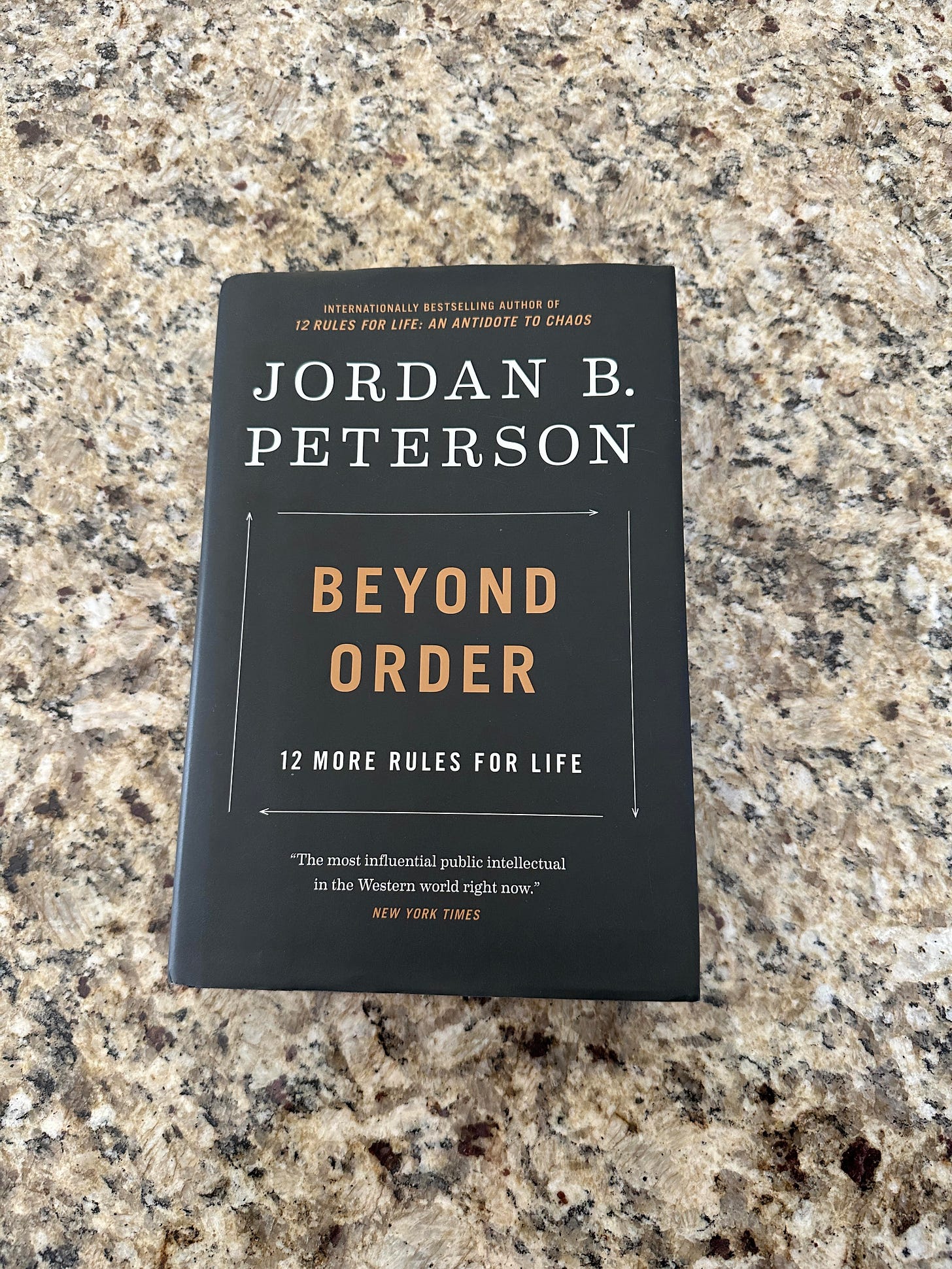Beyond Order by Jordan Peterson
Three Point Summary | Notes on big ideas from intriguing books
Jeff Sullivan’s Three Pointers
Jordan Peterson is a Canadian clinical psychologist, author, and media personality. His book Beyond Order: 12 More Rules For Life was released in 2021. It offers help in navigating the modern world.

Imagine who you could be, and then aim single-mindedly at that.
Jordan Peterson
I. The Utility of the Fool
A big turning point in my life was when my friend Danny introduced me to Jordan Petersons work.
The ‘utility of the Fool’ idea from Peterson gave me confidence to start this newsletter. I’ve always had a strong desire to learn. But the idea of doing it in public was scary. I didn’t like the idea of looking like an idiot on the internet.
But Peterson reframed being a young fool in an encouraging way:
The Fool is a young, handsome man, eyes lifted upwards, journeying in the mountains, sun shining brightly upon him-about to carelessly step over a cliff (or is he?) His strength, however, is precisely his willingness to risk such a drop; his risk to being once again at the bottom. No one unwilling to be a foolish beginner can learn. It was for this reason, among others, that Carl Jung regarded the Fool as the archetypal precursor to the figure of the equally archetypal Redeemer, the perfected individual.
This reminds me of Epictetus’ words to live by that “if you wish to improve, be content to be thought foolish and stupid.”
II. Become Your Own Hero
Peterson writes inspiring words about changing yourself:
Who are you-and who could you be?
The healthy, dynamic, and above all else truthful personality will admit to error. It will voluntarily shed—let die—outdated perceptions, thoughts, and habits, as impediments to its further success and growth. This is the soul that will let its old beliefs burn away, often painfully, so that it can live again, and move forward, renewed.
The only way to live life is like your the hero in the movie. But the hero has to evolve—they have to transform.
It’s a bad reason to keep doing something just because you always have. It’s a bad reason to keep hanging out with someone just because you always have. It’s a bad reason to keep believing something just because you always have. You have to evaluate how you spend your time in an objective way. You have evaluate the character of the people you spend time with in an objective way. You have to evaluate your own beliefs in an objective way.
And you have to be willing to, as Peterson said, kill parts of your life that aren’t serving you anymore. Subtraction (of habits/relationships/beliefs) is often more productive than addition.
Peterson also explains the necessity of having a plan for your future:
Aim at something. Pick the best target you can currently conceptualize. Stumble towards it. Notice your errors and misconceptions along the way, face them, and correct them. With will and luck, you will be the hero of that story, the disciplined sojourner, the creative transformer, and the benefactor of your family and broader society.
Discipline is the important word here though. A vision without disciplined action is nothing. It’s a fantasy.
III. The Beauty of Studying the Broad Human Past
Studying the wealth of human creativity across cultures and time makes your life experience richer. Peterson articulates why:
If you study art (and literature and the humanities) you do it so that you can familiarize yourself with the collected wisdom of our civilization. This is a very good idea—a veritable necessity—because people have been working out how to live for a long time. What they have produced is strange but also rich beyond comparison, so why not use it as your guide? Your vision will be grander and your plans more comprehensive. You will consider other people more intelligently and completely. You will take care of yourself more effectively. You will understand the present more profoundly, rooted as it is in the past, and you will come to conclusions much more carefully. You will come to treat the future, as well, as a more concrete reality (because you will have developed some true sense of time) and be less likely to sacrifice it to impulsive pleasure. You will develop some depth, gravitas, and true thoughtfulness. You will speak more precisely, and other people will become more likely to listen to and cooperate productively with you, as you will with them. You will become more your own person, and less a dull and hapless tool of peer pressure, vogue, fad, and ideology.
My friend Tucker once told me that “I’m a great admirer of beauty.” It was one of, if not the best compliment I’ve ever received. There is magic in gaining a deep appreciation of human civilization—past, present, and future. It makes you grateful for your species. It makes life better.


Jordan Peterson has some great ideas and advice. Love this!
THANK YOU JEFF.QUE ONDA ESSE!